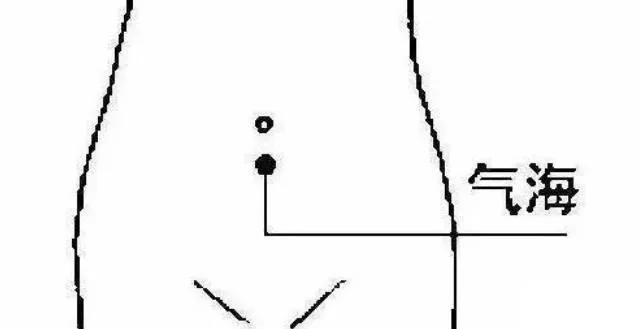Tip: Click on “Shiyan Traditional Chinese Medicine” above.
Many male patients in the outpatient clinic report a sudden increase in urination frequency, even reaching over ten times a day. After examination, it is found that chronic prostatitis is the culprit.
In addition to frequent urination, urgency, painful urination, and a feeling of incomplete urination, patients with chronic prostatitis may also experience feelings of heaviness, pain, and discomfort in areas such as the scrotum, testicles, and lower abdomen. In severe cases, erectile dysfunction and premature ejaculation may occur.
Besides medication, are there any simple and convenient methods to help improve symptoms such as frequent urination and incomplete urination?
It is recommended to massage six acupoints: Qihai, Guanyuan, Zhongji, Tianshu, Shuidao, and Zusanli.
Qihai
Location: Qihai belongs to the Ren meridian, the original point of the Huáng area, located in the lower abdomen, 1.5 cun below the umbilicus on the anterior midline.
Effects: Benefits the lower jiao, replenishes vital energy, and promotes the flow of qi and disperses stagnation. Massaging this acupoint can improve frequent urination, difficult urination, and post-urination turbidity caused by chronic prostatitis.
Patients with deficiency-cold gastrointestinal diseases can also benefit from moxibustion for enhanced warming and supplementation of yang, as well as tonifying the middle and harmonizing the stomach.
Guanyuan
Location: Guanyuan belongs to the Ren meridian, serves as the meeting point of the three yin meridians of the foot, and is also the front mu point of the small intestine. It is located in the lower abdomen, 3 cun below the umbilicus on the anterior midline.
Effects: Nourishes the kidneys and stabilizes the foundation, replenishes vital energy, and facilitates the return of yang. It is also commonly used in modern treatment for low blood pressure, neurasthenia, and male sexual dysfunction.
Zhongji
Location: Zhongji belongs to the Ren meridian, serves as the meeting point of the three yin meridians of the foot, and is also the front mu point of the bladder. It is located in the lower abdomen, 4 cun below the umbilicus on the anterior midline.
Effects: Zhongji is the front mu point of the bladder and is the area where the bladder’s qi gathers. It has the function of benefiting the bladder and clearing damp-heat, and can treat conditions such as frequent urination, urinary incontinence, and diarrhea.
Modern clinical practice often selects ren meridian acupoints to treat urinary system diseases, such as acupuncture or electroacupuncture at Zhongji, Guanyuan, Qihai, etc., for conditions like urinary incontinence, prostatic hyperplasia, and neurogenic bladder issues. Additionally, since the Ren meridian originates below Zhongji and travels upward through the abdominal cavity and up to Guanyuan, and the front yin is where the muscles are concentrated, it can also treat reproductive system disorders such as irregular menstruation, leukorrhea, nocturnal emission, and erectile dysfunction.
Tianshu
Location: Tianshu belongs to the stomach meridian of the foot yangming, located in the abdomen, 2 cun lateral to the umbilicus along the anterior midline.
Effects: Tianshu is an important acupoint for treating diseases of the front and back yin. It can be used to treat urinary system disorders, effectively promoting urination, regulating the intestines, and clearing damp-heat.
Modern research has also found that massaging Tianshu can benefit the spleen and stomach, providing significant effects in treating indigestion, irritable bowel syndrome, diarrhea, and other diseases.
Shuidao
Location: Shuidao belongs to the stomach meridian of the foot yangming, located in the lower abdomen, 3 cun below the umbilicus, 2 cun lateral to the anterior midline.
Effects: Used to treat conditions such as difficult urination, edema, nephritis, and cystitis. Massaging Shuidao can provide a bidirectional regulatory effect, facilitating the vaporization and distribution of bodily fluids, promoting the downward movement of the digestive waste, and can be used for urinary retention, frequent urination, and other abnormalities in fluid distribution and excretion.
Zusanli
Location: Zusanli belongs to the stomach meridian of the foot yangming, located on the outer side of the lower leg, at the knee joint,


